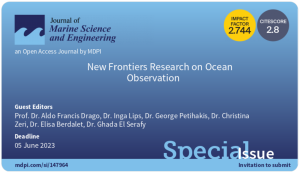The Journal of Marine Science & Engineering (SCIE-indexed, IF:2.744; ISSN 2077-1312) is an international open access journal reporting on marine science. A call for submission of papers to a Special Issue entitled “New Frontiers Research on Ocean Observation” has been recently published (https://lnkd.in/g7CTWsE2).
This initiative bears the MCAST flag through Aldo Drago, Professor in Oceanography at the Institute of Engineering & Transport, who launched the concept of the Special Issue, and is leading the guest editors composed of high profile scientists from Europe.

MCAST is engaging to invest in oceanography both academically through dedicated courses, and in research mode by engaging its academics in joint international collaborative funded projects. Our country still lacks a permanent observing system to measure key essential ecosystem variables. MCAST is contributing to support the design and implementation of the national marine observing system for the Maltese Islands in its various aspects concerning governance, infrastructure and the skilled workforce needed to implement and maintain the system.
Brief on the Special Issue:
We cannot manage what we do not observe and measure. With mounting demand for improved scientific knowledge needed for the sustainable development of the oceans, marine observations provide the raw material (data and information) and support a range of ocean applications covering operational (monitoring, surveillance, response), policy (planning, strategies, decision-making) and economic (industry, innovation) endeavours. This Special Issue targets the whole chain of data acquisition, harnessing, analysis and enhancement, supply to downstream and specialized services, and the overall exploitation of data as a common good. Contributions cover in situ and remote observations, their active link to numerical modelling, new technologies to innovate observing systems, improve their performance and enable low-cost solutions, multi-scale, multiple-purpose and multi-functional systems to resolve the physical and bio-chemical complexity and variability of the marine environment.
Furthermore, it tackles the quality, inter-operability and free access to operational data. Other aspects concern effective trans-national coordination and the creation of functional multi-governance frameworks to connect and synergize the numerous and diverse actors conducting observations within and across countries, operating at different institutional, geographic and sectoral levels.







 MCAST Main Campus
MCAST Main Campus  +356 2398 7100
+356 2398 7100
 information@mcast.edu.mt
information@mcast.edu.mt